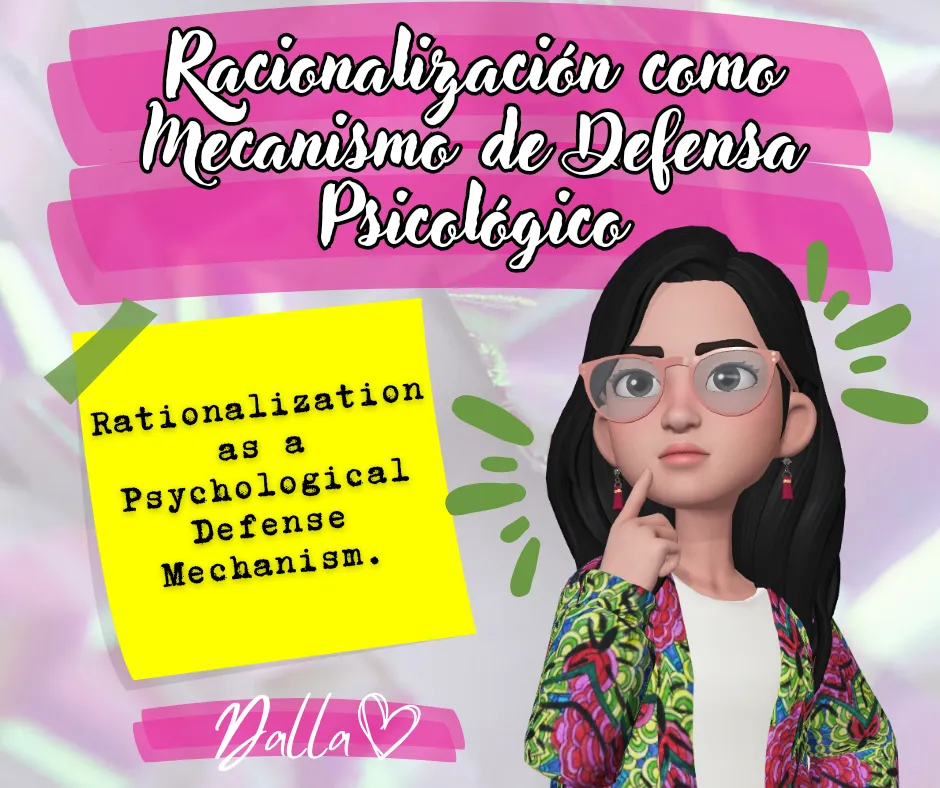

¿Conoces esa persona que tiene una explicación perfecta para todos sus errores y todo lo malo que le ocurre? Podría estar usando un Mecanismo de Defensa Psicológico de forma patológica y puede que ni siquiera ella lo sepa, sigue leyendo para que te enteres de qué se trata…
¡Saludos mis queridos #hivers que me leen! 🤗💖. El día de hoy Continuado con mis post de Psicoeducación y Psicoayuda, vengo a hablarles de un mecanismo que usa nuestro inconsciente para justificarse y evitar que nuestros defectos o nuestros propios errores puedan tener efectos negativos en la autoestima o nos cause un malestar lo suficientemente significativo que pueda afectarnos psicológicamente.
Estamos hablando de la llamada Racionalización o también conocida como Intelectualización, mediante la cual nuestra psique encuentra explicación a lo que nos sucede sin importar cuál sea, intentando ocultar los sentimientos de desagrado que eso genere, al aceptar que es realmente nuestra responsabilidad.
Este es un mecanismo que, como todos los otros de los que les he hablado, está bien usarlos, al final lo que busca nuestra psique es protegerse así misma ante el sentimiento de frustración, derrota, decepción, tristeza o dolor, así que está bien usarlos por momentos, está bien no dejar que nuestras emociones nos desborden y nos desestabilicen mentalmente.
You know that person who has a perfect explanation for all her mistakes and everything bad that happens to her? She could be using a Psychological Defense Mechanism in a pathological way and she may not even know it, read on to find out what it could be all about....
Greetings my dear #hivers who read me! 🤗💖. Today Continuing with my Psychoeducation and Psychohelp posts, I come to talk to you about a mechanism that our unconscious uses to justify itself and avoid that our defects or our own mistakes can have negative effects on self-esteem or cause us a significant enough discomfort that can affect us psychologically.
We are talking about the so-called Rationalization or also known as Intellectualization, through which our psyche finds an explanation for what happens to us no matter what it is, trying to hide the feelings of displeasure that this generates, by accepting that it is really our responsibility.
This is a mechanism that, like all the others I have talked about, it is okay to use them, in the end what our psyche seeks is to protect itself against the feeling of frustration, defeat, disappointment, sadness or pain, so it is okay to use them at times, it is okay not to let our emotions overwhelm us and destabilize us mentally.

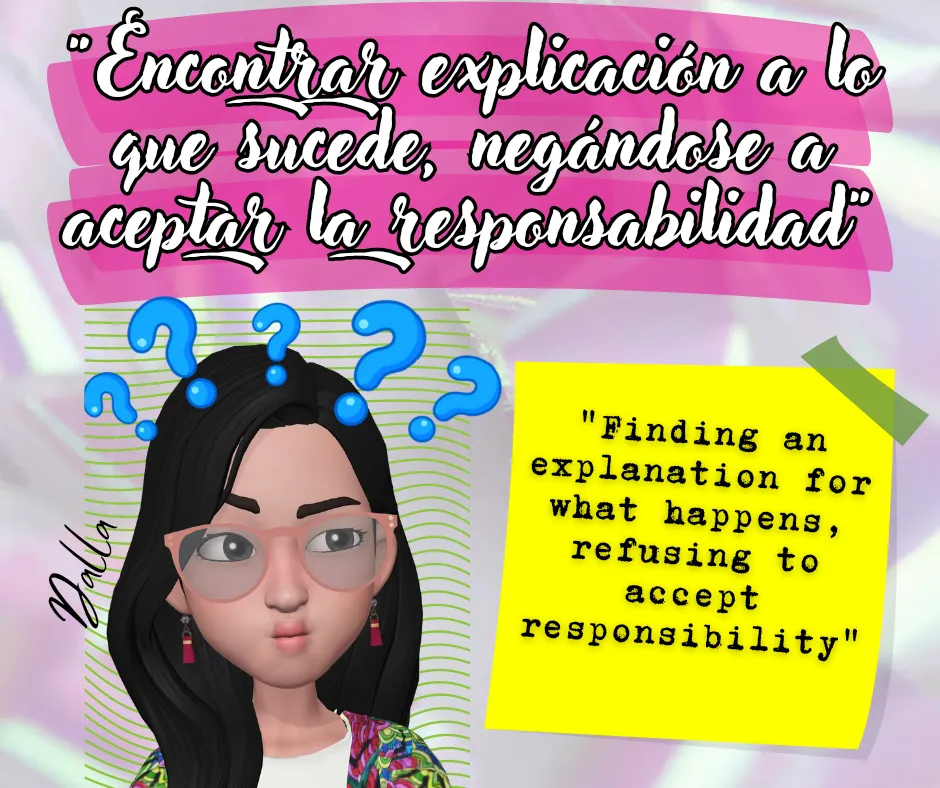

El decir que algo que nos pasó fue culpa del universo, de la mala suerte, de que no se dieron las cosas como debían, del clima, de una serie de eventos desafortunados etc, no está mal, al final si nos culpamos de todos los errores que cometemos sería demasiado que manejar por nuestra mente, porque todos los seres humanos cometemos errores todos los días de nuestra vida y el pensar en las consecuencias de tantos errores sería demasiado.
El problema real se presenta cuando usamos el mecanismo de forma persistente, prolongada y no aceptamos la posibilidad de que lo estemos utilizando, ya que, evidentemente, los errores que cometemos pueden afectarnos o afectar a otros considerablemente al justificarlos, lo cual no nos va a permitir reconocer en ningún momento que fue lo que hicimos mal y por ende no vamos a corregir nuestras acciones ni evitar cometerlas nuevamente.
Y, en el caso de que sea otro el que comete los errores, lo que podría suceder es que se seguirá perdonando a esta persona todo el tiempo ante errores evidentes y graves, haciendo que repitan constantemente el problema que te involucra a ti mismo, y se puede convertir en un círculo vicioso que puede llegar a ser muy peligroso.
Un ejemplo del uso de la Racionalización, son los casos de violencia doméstica, donde la persona agredida encuentra justificación a los actos de agresividad verbal y física del agresor, como cuando llegó tarde de una salida con amigos y la persona racionaliza que la agresión que recibió fue por su propia culpa, por lo que le perdona una y otra vez sus acciones al agresor.
To say that something that happened to us was the fault of the universe, bad luck, that things did not happen as they should, the weather, a series of unfortunate events etc, is not wrong, in the end if we blame ourselves for all the mistakes we make it would be too much to handle in our mind, because all human beings make mistakes every day of our lives and to think about the consequences of so many mistakes would be too much.
The real problem arises when we use the mechanism in a persistent, prolonged way and we do not accept the possibility that we are using it, since, evidently, the mistakes we make can affect us or affect others considerably by justifying them, which will not allow us to recognize at any time what we did wrong and therefore we will not correct our actions or avoid committing them again.
And, in the case that it is someone else who makes the mistakes, what could happen is that you will continue to forgive this person all the time in the face of obvious and serious mistakes, making them constantly repeat the problem that involves yourself, and it can become a vicious circle that can become very dangerous.
An example of the use of Rationalization, are the cases of domestic violence, where the aggrieved person finds justification for the aggressor's acts of verbal and physical aggression, such as when he/she arrived late from an outing with friends and the person rationalizes that the aggression he/she received was his/her own fault, so he/she forgives the aggressor over and over again for his/her actions.

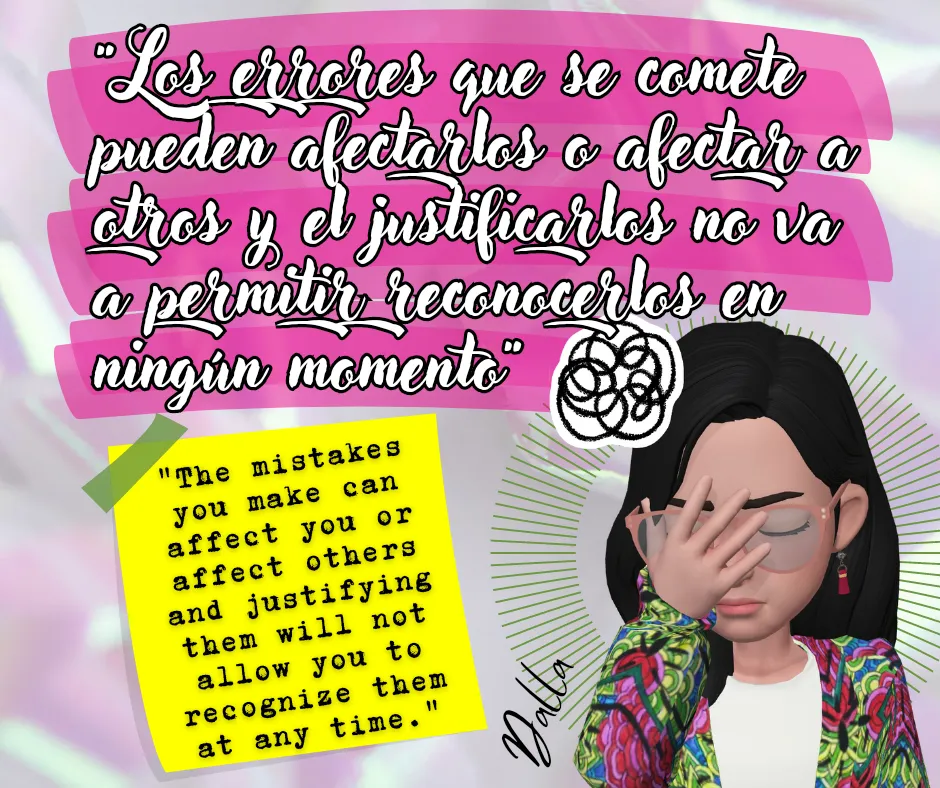

Al final hay muchos elementos psicológicos involucrados en el ejemplo que les acabo de dar, pero lo que sí es innegable es que la agredida será una persona frágil, con severos problemas emocionales, con probablemente dependencia afectivas a la que su inconsciente le está haciendo pasar por la peor de las calamidades, justificando una y otra vez estas agresiones de su pareja para evitar el abandono.
En ese caso que les acabo de explicar se está justificando a otra persona, y ese es más fácil de reconocer, a cuando la misma persona se justifica así mismo, por ejemplo la madre que golpea a un hijo y lo justifica porque a ella también la golpearon y ella creció "bien," al final tenemos una persona que está usando violencia como respuesta a una violencia que recibió y dejando claro que si ella soportó los demás también pueden hacerlo, olvidándose que todas las personas son diferentes y que, muy probablemente, ella haya crecido con algún tipo de problema emocional que aún no haya descubierto.
También tenemos la situación donde la persona golpea a su hijo y el sentimiento de culpa la invade, es algo moralmente incorrecto y ella lo sabe, es algo doloroso lo que hizo y lo que ve en los ojos de su hijo, por lo que su inconsciente inmediatamente buscará evitar el sentimiento de desprecio hacía sí mismo y justificará el acto culpando al niño porque le faltó el respeto o porque él fue el que actuó mal y provocó su actuación.
Y así tenemos innumerable cantidad de situaciones, básicamente se trata de buscar explicaciones con lógica o no, no importa si pueden o no ser reales, lo importante es que expliquen su comportamiento y lo liberen de los sentimientos desagradables que implicaría el haber cometido ese error.
In the end there are many psychological elements involved in the example I have just given you, but what is undeniable is that the victim will be a fragile person, with severe emotional problems, with probably emotional dependence to whom her unconscious is making her go through the worst of calamities, justifying again and again these aggressions of her partner to avoid abandonment.
In this case that I have just explained is justifying another person, and that is easier to recognize, than when the same person justifies himself, for example the mother who hits a child and justifies it because she was also hit and she grew up "well," in the end we have a person who is using violence as a response to a violence she received and making it clear that if she endured the others can also do it, forgetting that all people are different and that, most likely, she has grown up with some kind of emotional problem that she has not yet discovered.
We also have the situation where the person hits her child and the feeling of guilt invades her, it is something morally wrong and she knows it, it is something painful what she did and what she sees in her child's eyes, so her unconscious will immediately seek to avoid the feeling of contempt towards herself and will justify the act blaming the child because he disrespected her or because he was the one who acted badly and provoked her action.
And so we have countless situations, basically it is about looking for explanations with logic or not, it does not matter if they may or may not be real, the important thing is to explain their behavior and free them from the unpleasant feelings that would imply having made that mistake.

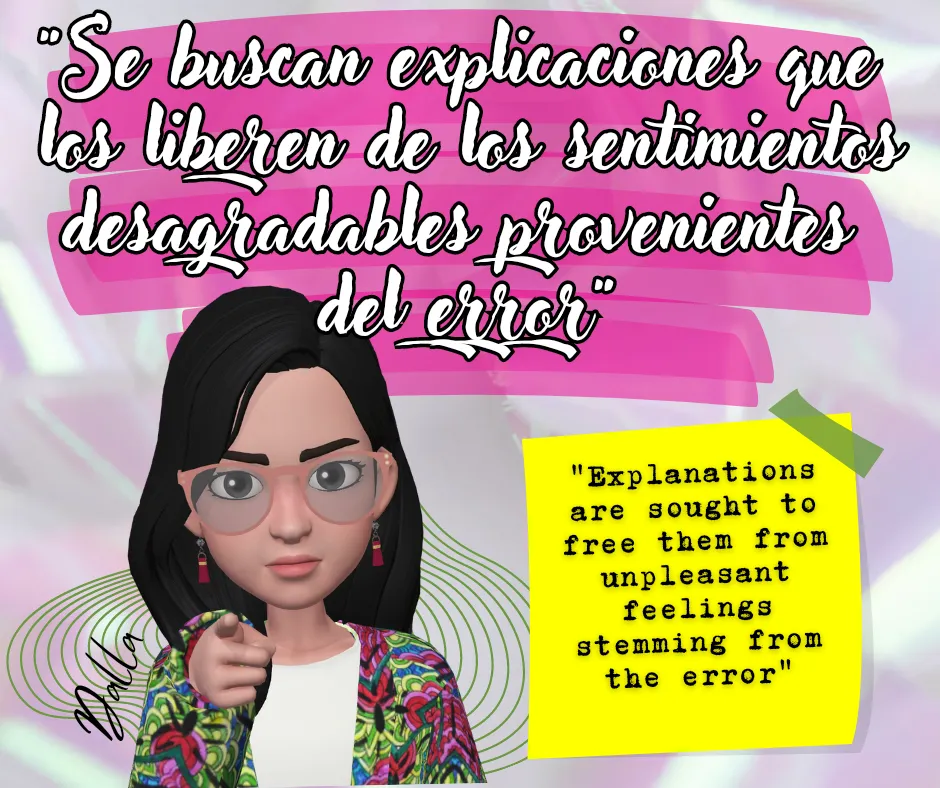

Este mecanismo actúa tan bien y se lleva a cabo de forma tan efectiva por nuestra psique, que todas esas justificaciones se llevan a cabo de manera inconsciente y pueden muchos intentar hacerle ver lo que están haciendo mal, pero la persona no lo verá, hasta que realmente tenga un contacto duro con la realidad o se le haga entender y después de recibir la ayuda pertinente, comprenda, después la de una profunda introspección, que es su propia mente la que la hace encontrar explicación a todo eso que no debería, incluso haciéndola creer cosas que no son.
Como ven amigos, este es uno de los mecanismo de defensa más complejos porque el inconsciente encuentra coherencia y explicación a todo lo acontecido, por lo que la persona está realmente convencida de que lo que piensa tiene sentido, hay patrones, hay correlación entre las justificaciones, por ello será muy difícil hacerlo cambiar de opinión, es ahí cuando esto se convierte en algo patológico y difícil de manejar, cuando la persona está 100% convencida de su verdad, por lo que en la mayoría de las ocasiones dejaran de lado las opiniones de otros.
Ya para finalizar, me despido siempre recordándonos que estos post son educativos, la idea es que intentemos pensar y razonar bien antes de hablar o actuar, entiendo que probablemente si eres tú el que utiliza este mecanismo no te des cuenta, pero si tienes un problema emocional de algún tipo y muchas personas te dicen que estas errado en tu opinión, tómalo en cuenta, no necesariamente porque debas estar errado, pero sí analiza con detenimiento esa opinión, escarba en ti mismo si cerciorarte de que la tuya sea la correcta.
La certeza completa sobre lo que sea, puede llegar a ser un arma de doble filo amigos, recordemos que todos vemos el mundo de acuerdo a nuestra perspectiva y dicha perspectiva está influenciada por demasiados factores mentales, espero les haya sido de utilidad el post y si creen que pueden estar usando este mecanismo, no duden en buscar ayuda, tarde o temprano la necesitarás.
This mechanism works so well and is carried out so effectively by our psyche, that all these justifications are carried out unconsciously and many may try to make him see what they are doing wrong, but the person will not see it, until he really has a hard contact with reality or is made to understand and after receiving the relevant help, he understands, after a deep introspection, that it is his own mind that makes him find an explanation to all that he should not, even making him believe things that are not.
As you can see friends, this is one of the most complex defense mechanisms because the unconscious finds coherence and explanation to everything that has happened, so the person is really convinced that what he thinks makes sense, there are patterns, there is correlation between the justifications, so it will be very difficult to change his mind, that is when this becomes something pathological and difficult to handle, when the person is 100% convinced of his truth, so in most cases they will leave aside the opinions of others.
Finally, I always say goodbye reminding us that these posts are educational, the idea is that we try to think and reason well before speaking or acting, I understand that probably if you are the one who uses this mechanism you do not realize, but if you have an emotional problem of some kind and many people tell you that you are wrong in your opinion, take it into account, not necessarily because you must be wrong, but carefully analyze that opinion, dig into yourself if you are sure that yours is correct.
The complete certainty about anything, can become a double-edged sword friends, remember that we all see the world according to our perspective and that perspective is influenced by too many mental factors, I hope you have found the post useful and if you think you may be using this mechanism, do not hesitate to seek help, sooner or later you will need it.

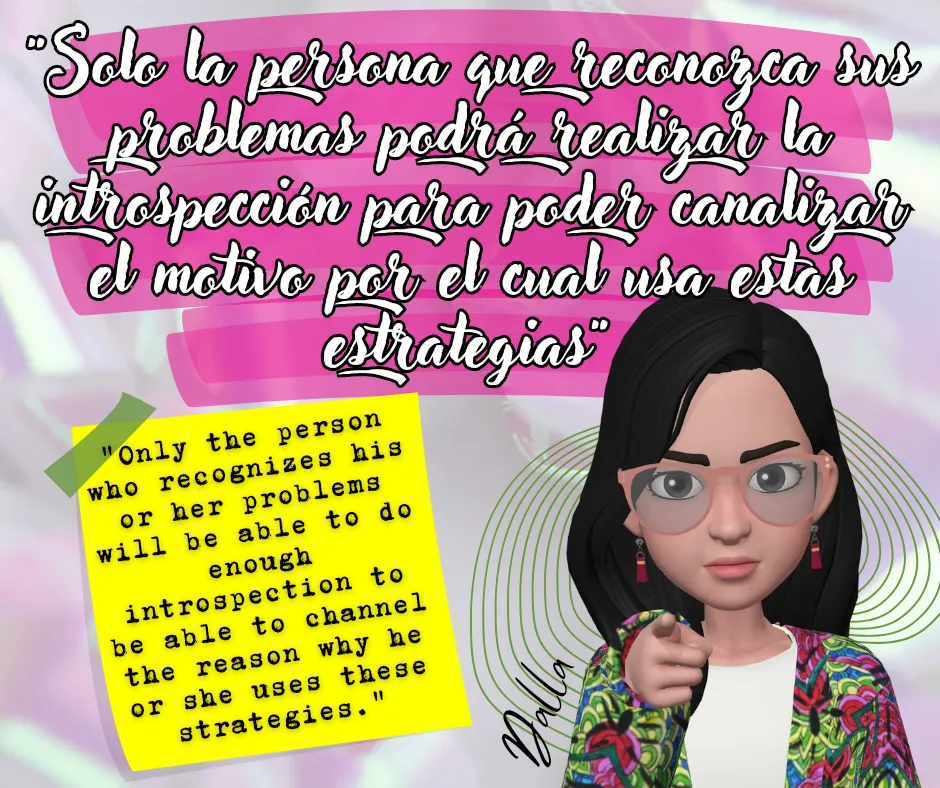

Thank you for stopping by and reading!💖

Todos los banners fueron creados por @liveofdalla usando Canvas y Picsart con recursos gratuitos de ambas Apps.
(Eng) All the banners were created by @liveofdalla using Canvas and Picsart with free resources from both Apps.
DeepL
